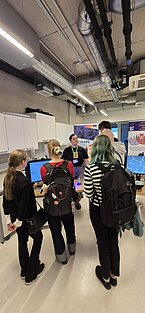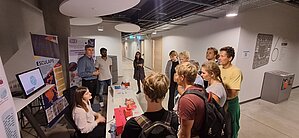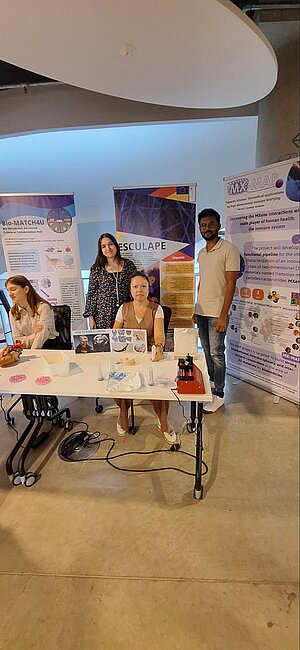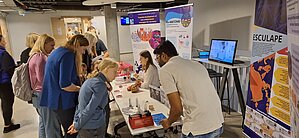Representation of the ESCULAPE Project at Researchers' Night – 26 September 2025
The Researchers’ Night 2025 event at the University of Latvia served as an engaging and interactive platform to promote science, technology, and innovation to the general public. It highlighted the achievements of Latvian and European research communities and fostered dialogue between scientists and society.
As part of this initiative, the University of Latvia, together with partners of the ESCULAPE project, showcased ongoing research focused on electroconductive polymeric scaffolds, electrospinning technologies, and nanofiber-based materials for advanced biomedical applications.
Visitors had the opportunity to explore the principles of electrospinning through live demonstrations and visual presentations, gaining insight into how nanofibers can be engineered to promote tissue regeneration, drug delivery, and infection control. Researchers also presented the potential of MXene-based functional coatings for the development of smart wound dressings and biosensing systems capable of real-time infection monitoring.
By engaging students, young researchers, and the wider public, the participation of the ESCULAPE project at Researchers’ Night contributed to raising awareness about the role of nanotechnology in modern medicine. The event emphasized the value of international collaboration within the HORIZON-MSCA-2022-SE-01 ESCULAPE framework, encouraging future scientific cooperation and inspiring the next generation of innovators in biomedical science.
Scientific Research seminar - May 2025
As part of their visit in May 2025 to the University of Eastern Finland (UEF), researchers Viktoriia Holobnycha (Sumy State University, Ukraine) and Viktoriia Korniienko (University of Latvia) delivered presentations on their scientific research conducted within the framework of a collaborative project.
The presentations were delivered to Professor Marjukka Kolehmainen, Dr. Jenni Korhonen, and members of the Institute of Public Health and Clinical Nutrition at UEF. The researchers presented their progress on the development of MXene-based electroconductive scaffolds for biomedical applications.
These presentations formed part of a broader scientific exchange that also included hands-on experimental work, participation in the MicroAmes test and other research activities in the Food Research Laboratory, as well as strategic discussions on future collaborative research initiatives.
Researchers' Night – 27.09.2024
Representation of ESCULAPE Partners at Researchers' Night – 27/09/2024
The Researchers’ Night event provided an opportunity to showcase scientific achievements in Latvia, offering the general public a chance to explore cutting-edge research and technological advancements. As part of this initiative, ESCULAPE project partners actively participated, presenting their ongoing work in electrospinning technologies and nanofiber-based materials.
Vipin Kumar from RESPILON and Ines Marques from Biofabics represented the ESCULAPE consortium, engaging with attendees through interactive demonstrations and discussions. Vipin Kumar showcased RESPILON’s expertise in needleless electrospinning techniques, highlighting recent advancements in nanofiber membrane fabrication for biomedical applications. His presentation included insights into the integration of MXene-based electrospun materials and their potential in healthcare and filtration technologies.
Ines Marques from Biofabics introduced the audience to biofabrication strategies for tissue engineering applications. She demonstrated how advanced biomaterials and 3D electrospun scaffolds are being developed to support regenerative medicine and organ-on-a-chip technologies. Visitors had the opportunity to learn about the role of electrospinning in creating biomimetic structures that enhance cell growth and tissue regeneration.
The participation of ESCULAPE partners in the event contributed to raising public awareness about nanotechnology-driven solutions in biomedical science. Through hands-on exhibits and expert discussions, the researchers emphasized the importance of collaborative European initiatives in pushing the boundaries of innovation.

 LU konference
LU konference








